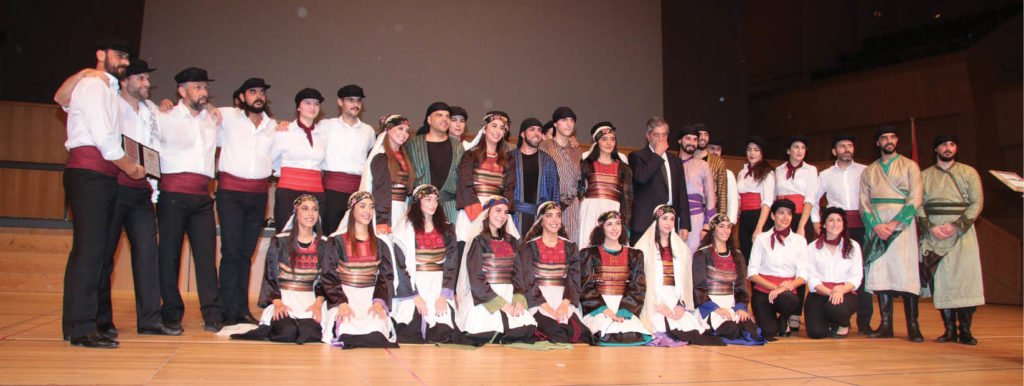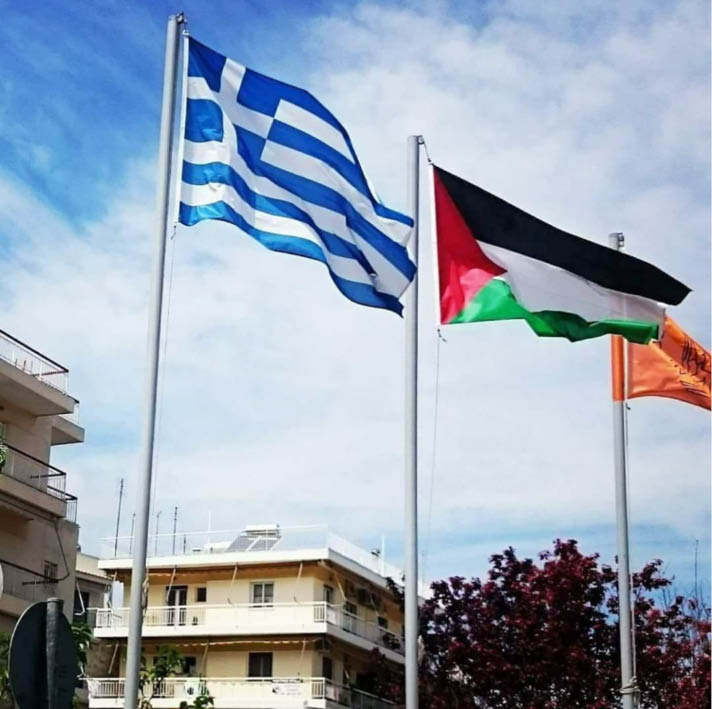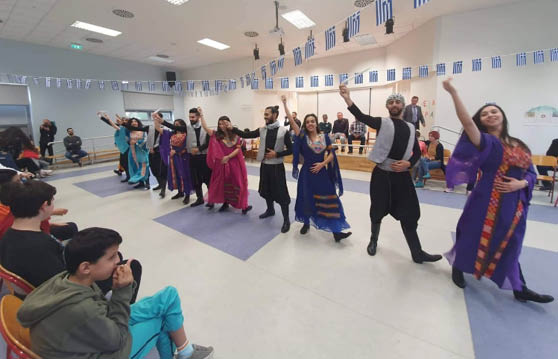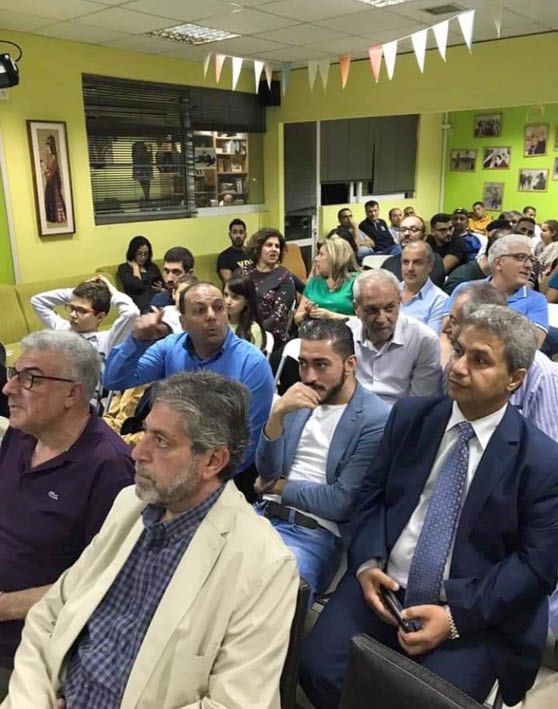The Greek and Palestinian people have numerous points of connection. They share religious ties, as most of the Palestinian Christians are Orthodox. Since the 1960’s and 70’s, many Greeks have visited Jerusalem in religious pilgrimage, especially during the Easter period (Hagina), creating social relations with the Palestinian families of Jerusalem. Furthermore, during the late 1960’s and early 70’s, many Greeks who belonged to the socialist anti-dictatorship movement were trained in PLO camps in Lebanon to fight against the dictatorship along with some Palestinians who joined the struggle. Hundreds of the many Greeks who served in medical relief efforts in Palestinian refugee camps remained and started their own families.
In 1975 and again in 1982, large numbers of Palestinian immigrants came to Greece fleeing the civil war in Lebanon. A first wave of migration of Palestinians to Greece had begun back in the 1960’s and early 70’s, when thousands of Palestinian students pursued or finished their university studies in Greece (education is free for Palestinian students in Greece, and living expenses were low). Many of these students went to Thessaloniki to study medicine, dentistry, pharmacology, law and sciences.

The Palestine Liberation Organization opened a representation office – which later on was upgraded to a diplomatic representation office – in Athens in 1982, the same year in which Greece adopted new legislation (EY81) that enticed offshore companies to move their headquarters to Greece. Many Middle Eastern companies whose representative offices originally had been based in Beirut now moved their headquarters to Greece, bringing along some of their employees. Among them were well-known companies, such as the Consolidated Contractors Company (CCC) that has its headquarters in Athens but mainly employs Palestinians. Also, when the PLO was forced to leave Lebanon, Greece was chosen as its first destination, as chairman Yasser Arafat had developed brotherly ties with the Greek prime minister and leader of the Socialist Party, Andreas Papandreou. Many Palestinian freedom fighters have remained in Greece since that time, as they married and started their own families.
The second wave of migration to Greece came with the first Gulf War in 1990–91. Many businessmen left Kuwait at that time and took their families and businesses with them. Numerous Palestinians followed and were recruited by Palestinian and local companies in Greece.
Even though since then, the number of Palestinian immigrants has dropped, families and their children have begun to grow, these children married in Greece, and so the Palestinian-Greek community has grown and expanded. It is worth mentioning also that at various times, people of Greek origin who lived in Palestine (mainly Jerusalem, Bethlehem and Ramallah) decided to return to their homeland as well. In a rough estimation we could say that today, around 5,000 Palestinians live in Greece, over 3,500 of them in Athens while the rest resides in major Greek cities such as Thessaloniki and Patras.
Due to its geographical location, Greece was the first European Union member state many Palestinian refugees reached on their journey to the west.
Over the last decade, Greece’s proximity to Syria, Lebanon, and Turkey – the latter two among the main countries that are receiving refugees from Syria by land and sea – has resulted in a mass influx of refugees into the country. This is mainly because refugee camps in Syria have been demolished and access to the Gaza Strip has been blocked. Thus, along with thousands of Syrians, many Palestinian refugees from Syria have ended up in Greece. Their exact number is difficult to assess accurately, as most of them have not claimed asylum in Greece. Some were unable to do so because the sheer numbers of refugees caused an overload in the Greek asylum system and, at times, made it inaccessible; others preferred to continue their journey to other EU countries and to claim asylum there.

We can find hundreds of specialists such as doctors, dentists, and others in Greece’s medical sector; some are department directors in Greek hospitals and clinics. They participate, make contributions, and are integrated fully into Greek society.
Other Palestinians are involved in politics, where a few are active members of left-wing political parties. Although no Palestinians have been elected to the Greek Parliament to this day, some have been elected to municipal councils.
The Society of the Palestinian Community has two branches, one in the capital, Athens, and the other in Thessaloniki. They host cultural and social events at national occasions and offer tutoring in Arabic language and sports activities. In Thessaloniki, the Union of Friends of Palestine brings together hundreds of Greek and Palestinian members, focusing on the enhancement of the friendship between the two peoples. Recently, they have sent a medical delegation of Greek and Palestinian medics to Palestine, arranged through the Embassy by the Palestinian Ministry of Health.
Regardless of internal political differences, all Greek governments have stood in support of the Palestinian cause, endorsed the two-state solution based on the pre-1967 borders, with East Jerusalem as Palestine’s capital, and voted in favour of the most crucial UN resolutions regarding Palestine. University scholarships are awarded by the Greek Ministry of Education, and humanitarian aid is offered to the illegal immigrants who have fled from Syria and the Gaza Strip (around 2000 persons).
Lately, tens of Palestinians have been coming to Greece in order to invest in the real estate sector.
The Greek people have always stood in solidarity with the Palestinian people and their national struggle to end the Israeli colonial occupation.
Besides offering consular services to all Palestinians and guidance and assistance for the newly arrived students, the Embassy of the State of Palestine approaches and strives to strengthen relations with the Greek public by hosting cultural events, gatherings, and discussion sessions on national Palestinian holidays. It engages in public diplomacy with municipalities, NGOs, and political parties by holding joint cultural and solidarity events. Beyond the official diplomatic relations, the embassy makes efforts to facilitate official exchange visits and to build bilateral agreements in various sectors. In December 2015, the embassy succeeded in obtaining an unanimous parliamentary vote on a resolution that called on the Greek Government to recognize the State of Palestine within the pre-1967 borders and with East Jerusalem as its capital. Another vote, this time on the decision to deem illegal the Israeli colonial settlements, is still pending. A Greek-Palestinian Parliamentary Friendship Group and, more recently, a Joint Ministerial Committee have been established.





